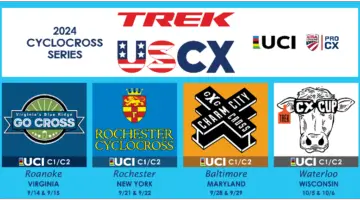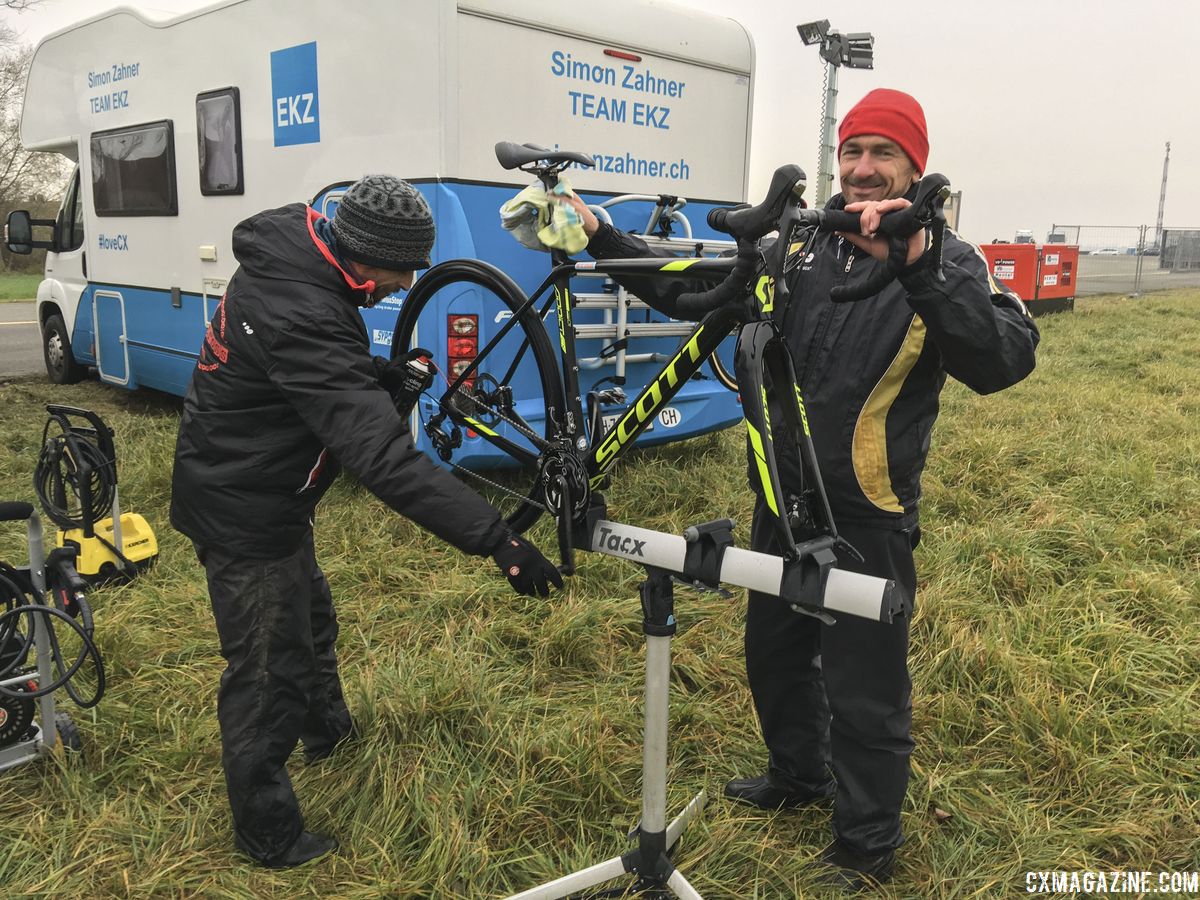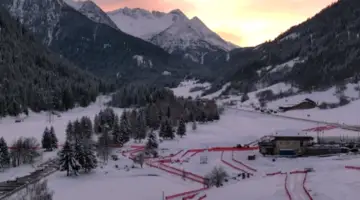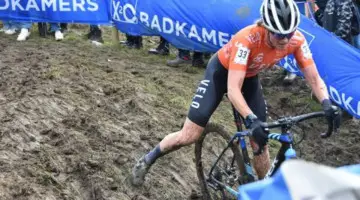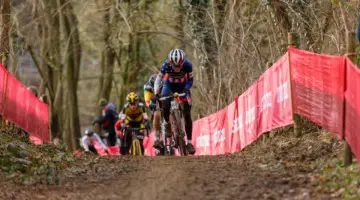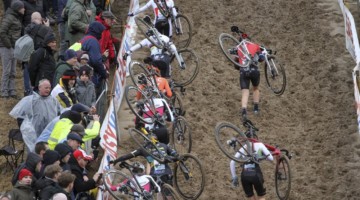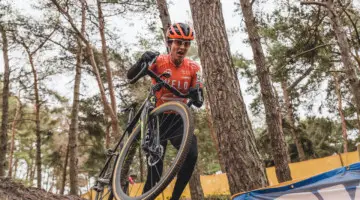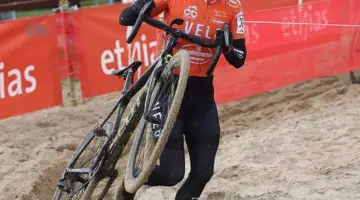As I described in my last column, Belgium’s Kerstperiode was logistically easy.
The foreigners came in great numbers and the races were accommodating. Race materials were often in English, signage was ample and even the parking staff were quick to switch to English.
Then came Brussels Universities Cyclocross, a new race on the calendar.
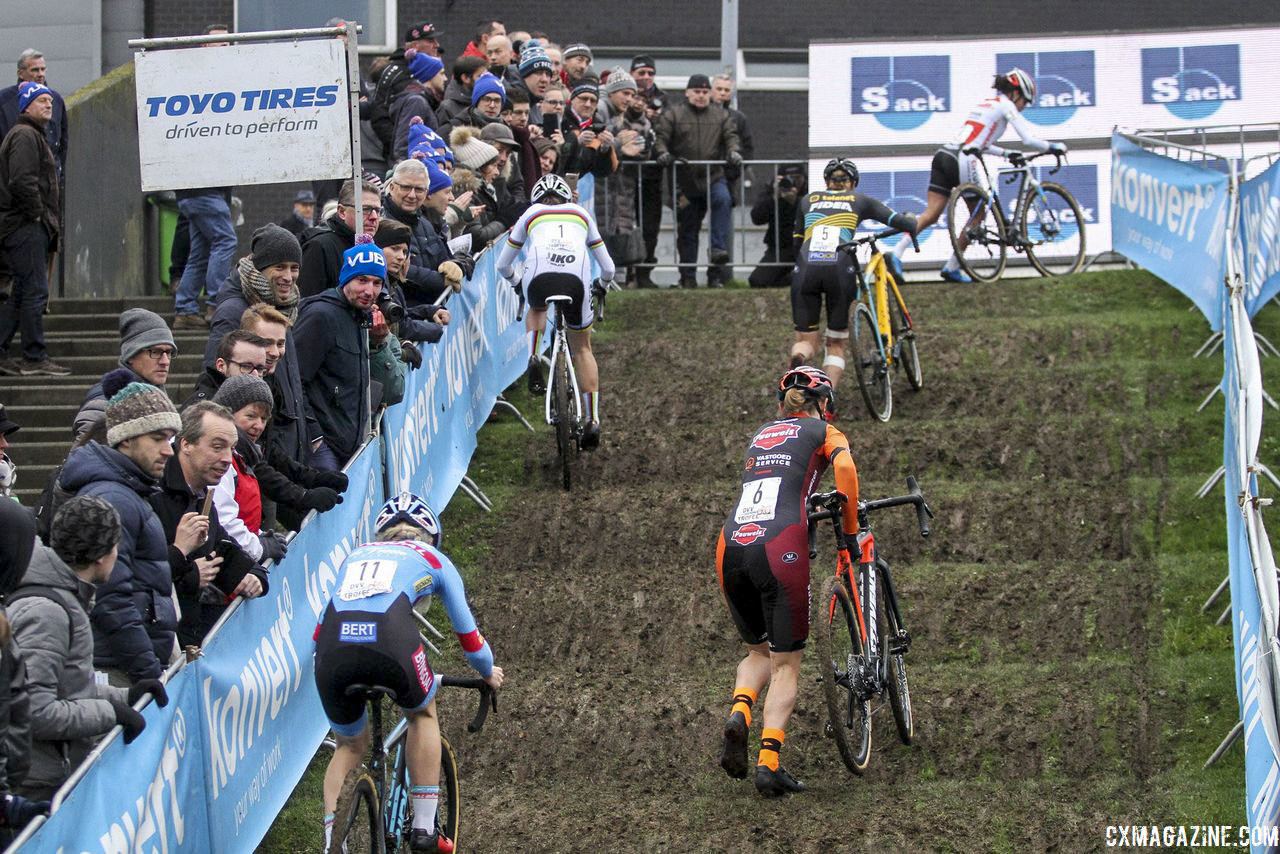
THe new race in Brussels brought its own challenges. 2019 Brussels Universities Cyclocross. © B. Hazen / Cyclocross Magazine
Challenges and Success on Campus
The first of the day’s challenges in Brussels was parking.
One of the parking guards—oops, I mean “attendants”—expressed his concern that we were parking our car in racer parking. He explained the parking was for racers and their campers.
After my mechanics explained that I was a “renner,” (racer), I chimed in: “Maar wij hebben geen camper, wij hebben een auto.” (But we don’t have an camper, we have an auto.) While this is no doubt toddler speak, I was inordinately proud that this language burst from my lips without pre-planning.
Having said my peace, I continued to unload the car while employing my second tactic, “Let the mechanics handle it.”
I am never quite sure how my mechanics resolve these issues, but they always do. I know that alcohol, chocolate and fruit baskets have been known to grease squeaky wheels. Likewise, I understand that teams with bigger budgets may prevent parking conflicts in advance via cash donations. This, of course, is mere speculation!
Sure enough, the guard soon ambled off to address another issue. I believe he grew tired of our particular conflict.
Inschrijving (registration) was equally challenging.
There was an address buried on the race webpage, but no signage. Inschrijving was located diagonally across the course from rider parking. The most confounding part was that, this being a new race, few volunteers knew where anything was. I used my phone to navigate to inschrijving the long way, around the course via the roads.
On the way back, I decided I was up for the challenge for cutting through the course. Coincidentally, I met eventual race winner Ceylin del Carmen Alvarado doing the same. We exchanged notes: we both had taken the roads to inschrijving but were keen on taking the shortcut back. Accordingly, we picked our way through campus heading in the general direction of rider parking (where she undoubtedly had an camper parked).
We encountered just one problem. At a course entrance, volunteers would not let us in, despite our packets with numbers and pit passes. I stood there while Alvarado negotiated our entry in Dutch. I wonder if the volunteer recognized her later in the day when she led the race start to finish.
With courses being unusually dry lately, they have been less challenging. Loenhout and Diegem were lesser courses without the mud. However, Brussels Universities Cyclocross was truly up to Belgian cyclocross standards. It had challenging with runs up and down, one downhill plunge and numerous partially wrapped, flat-inducing curbs. It was necessary to take the time to do a good pre-ride, thinking through how to personally best manage obstacles.
My race that day was solid. Technically, I rode about as well as I am capable of, but I lacked spring in the legs and mental toughness to bury myself. Just three days removed from Kerstperiode, I was running on fumes like everyone else.
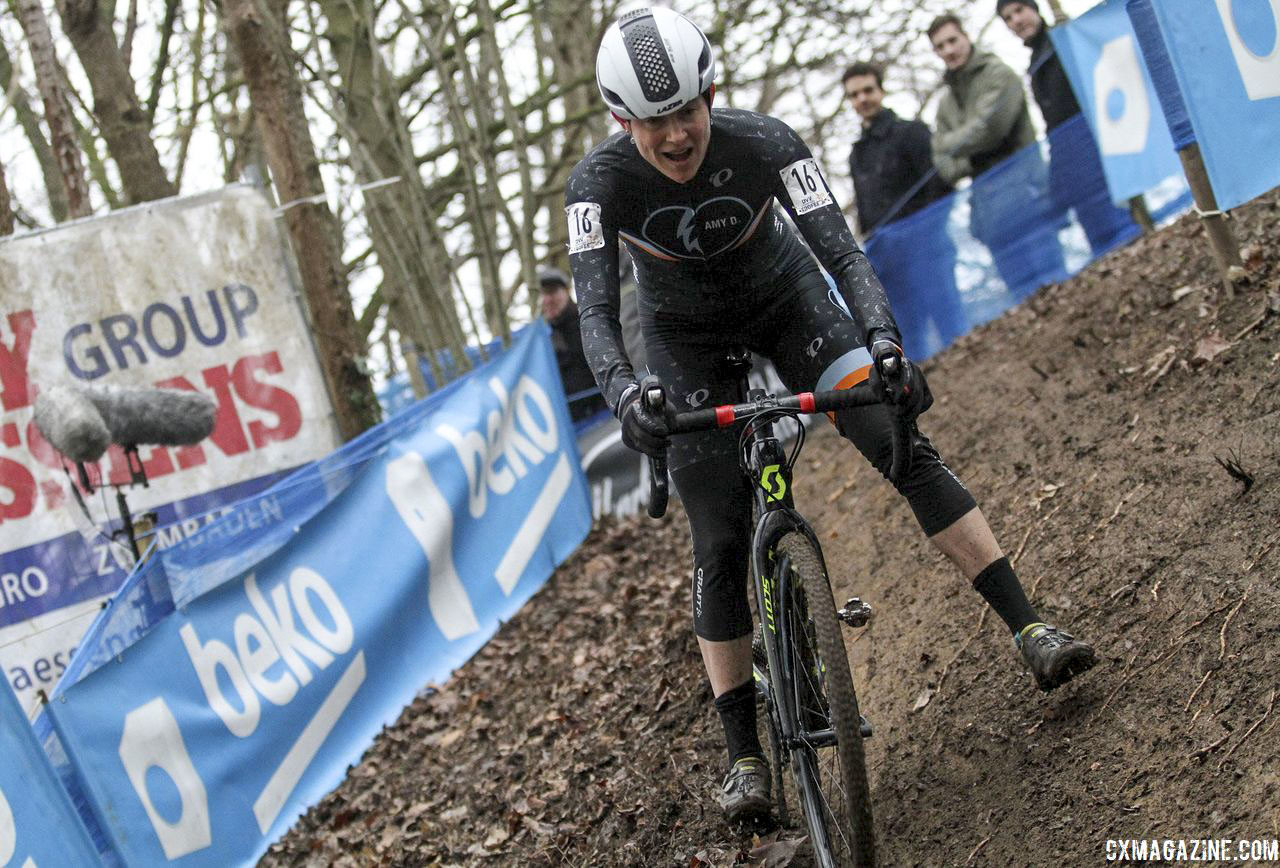
Corey Coogan Cisek continued her cyclocross apprenticeship on campus. 2019 Brussels Universities Cyclocross. © B. Hazen / Cyclocross Magazine
Honestly, I enjoyed the “Belgian challenges” of Brussels Universities Cyclocross. After all, I paid my dues last year. Each race was a hunt and search expedition to find inschrijving, ever-absent toilets and the best way (or any way) to get to the start line.
Pre-rides were devoted not to line choice and tire pressure, but to teaching myself to ride overwhelming features. I’ll even admit that a parking conflict once brought me to tears last year!
In a lot of ways, Brussels Universities Cyclocross was one big “fist pump” for me—I am finally enjoying the spoils of last year’s hard road.
What I Didn’t Do
Mid-January has been more about what I didn’t do than what I did.
I didn’t go to Spain.
Just after the first of the year, there was a mass exodus from Belgium. The Brits went home to prepare for their National Championships (although some went to someplace warm first to cram in a little training). The Americans went to Spain.
I thought about Spain. It’s inexpensive to get there and inexpensive to stay there, but my budget is dwindling. At this point, what I term inexpensive (“goedkoop”) is less than three Euros, and Spain did not fit that bill.
Staying in Belgium worked out just fine as it has been unusually dry and warm. I haven’t seen a snowflake since Zonhoven; I fear Belgium’s storm clouds are broken!
While it saddens me that the usual “mudder” courses are dry and lightning fast, the weather has been good for training. I still need to wash my bike every single day, but I have yet to ride inside.
I also haven’t been training hard. Rather, I have been recovering hard. Yes, I am on my bike almost every single day, turning the pedals, but the largest percentage of my training has been recovery rides.
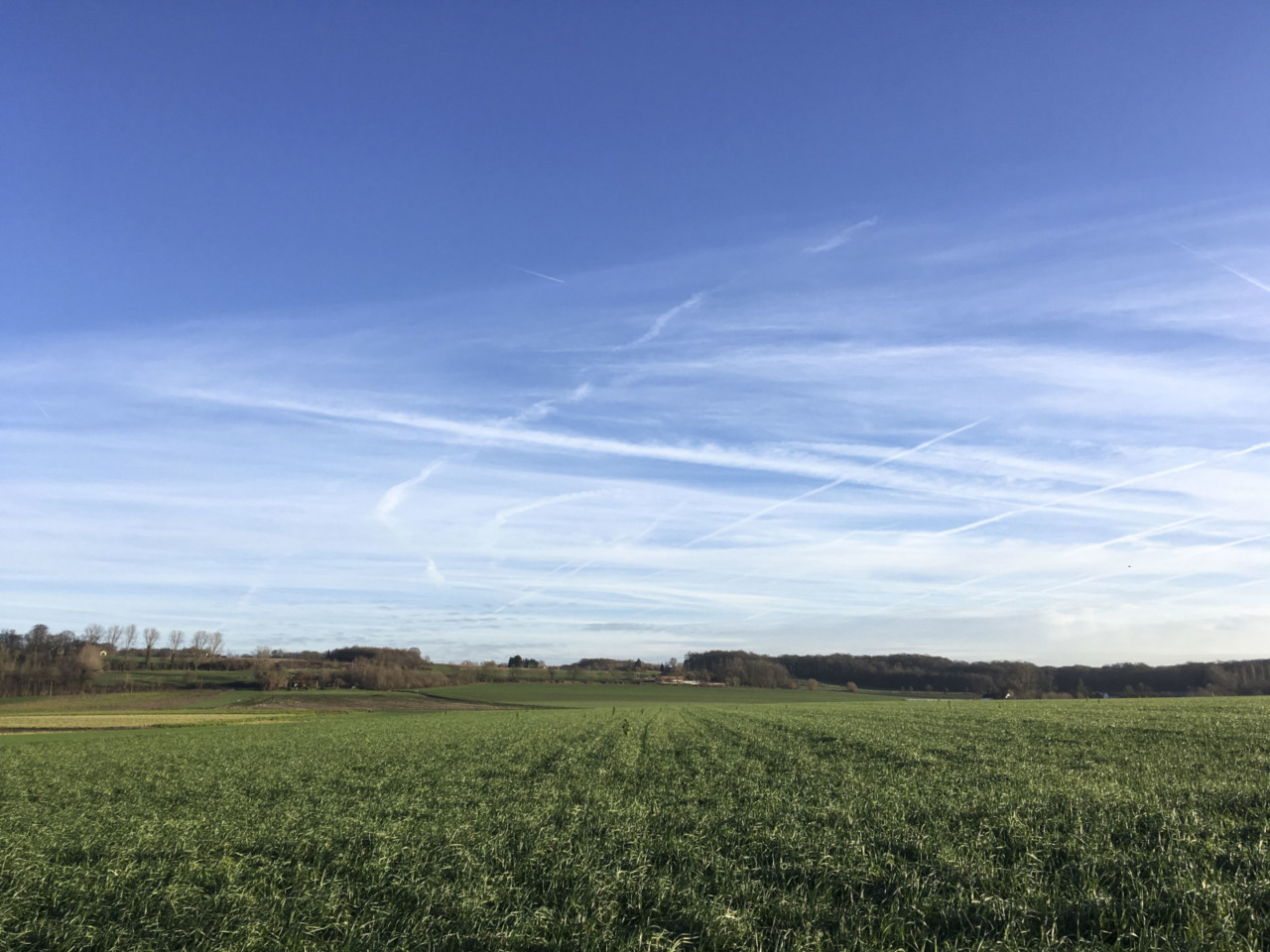
With conditions unseasonably nice, Coogan Cisek has had lots of time for recovery rides. © Corey Coogan Cisek
Initially, I was so cooked from Kerstperiode, I couldn’t think straight, so I wasn’t in the position to object. Now, the guilt is starting to creep in so, I figure, I must be pretty much recovered.
It’s notable that this time last year, I was still “doing.” My volume was low (much lower than it currently is), but intensity made up a much greater proportion of my training. Last year, I cracked wide open in February, but this year, with more rest…
I’m beginning to think that Coach Helen is, as they say in Great Britain “brilliant.” This rest thing: brilliant!
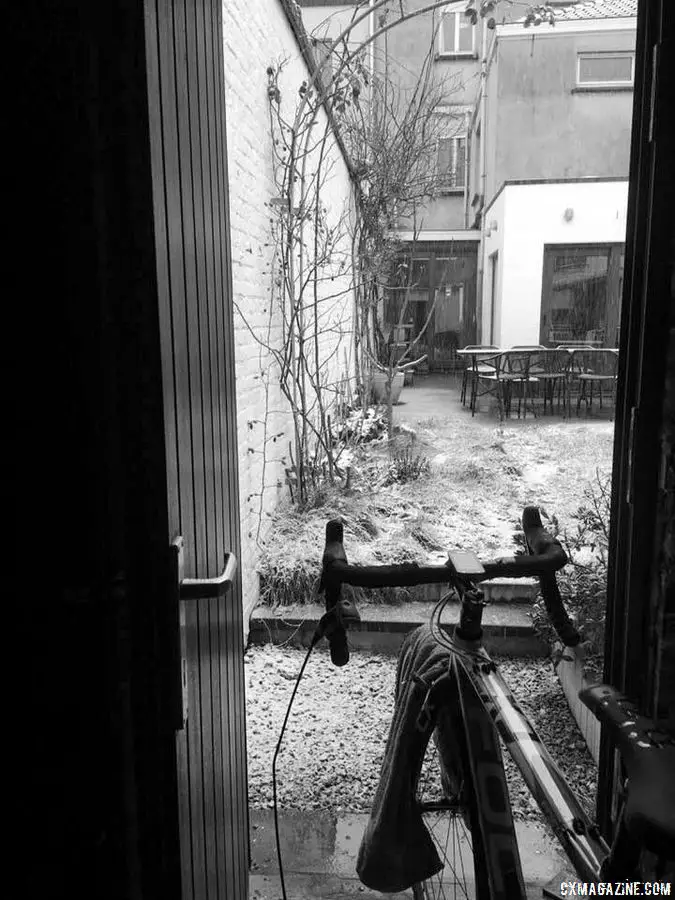
Last year featured a lot of days inside on the trainer. Corey Coogan Cisek rider diary. © C. Coogan Cisek / Cyclocross Magazine
I’m also not having much of a social life. Kerstperiode was lively with all the Americans at the races. Yet, with the “Spain exodus,” my life has grown very, very quiet. This is how it was for me last year, and how I imagine it was for Amy Dombroski, as well as Elle during her first years here—a very solitary existence.
Save speaking with my husband via WhatsApp and a few words spoken to strangers while out and about, I have not heard my own voice in several days.
There are alternatives. The Chainstay is 250 meters down the road, and the owner Gregg is an American, so I could easily walk over there for English-speaking interaction. Likewise, my mechanics and other friends have made it clear that their doors are always open. However, I am an introvert and get my energy in solace, so I am genuinely rather satisfied with life.
It bears noting though that for some, the isolation under Belgium’s unrelenting gray could be overwhelming.
Paying the Piper
Yup, I caught a cold. Kerstperiode ended, my husband flew home and the next day I awoke with a scratchy throat.
Kerstperiode is an immune system challenge. With the density of races, our immune systems become ridiculously fragile.
As if Kerstperiode were not enough of a challenge in itself, I chose to heap on some travel stress. I felt it necessary to go to Switzerland and Luxembourg in search of UCI points, yet I also raced much of Kerstperiode in Belgium. In retrospect, it was too much.
It looked good on paper, until I really delved into the details. “Wait, I am going to race Namur then the next day we are going to drive to Switzerland, and then I am going to race in Switzerland, and then the next day we are going to drive back to Belgium, and the next day I will race in Belgium?”
I raced 5 times in 10 days in 3 countries and only once was there more than a day between races. The holidays added challenge as we traveled on Christmas Eve, New Year’s Eve, and New Year’s Day, so most stores and restaurants were closed. Then I generated lots of dirty clothing, yet never rented an Airbnb with laundry.
It was go-go-go, day after day, and as project manager and soigneur of this whole operation, I felt I could never catch up. It wasn’t the racing that kicked my immune system to the curb!
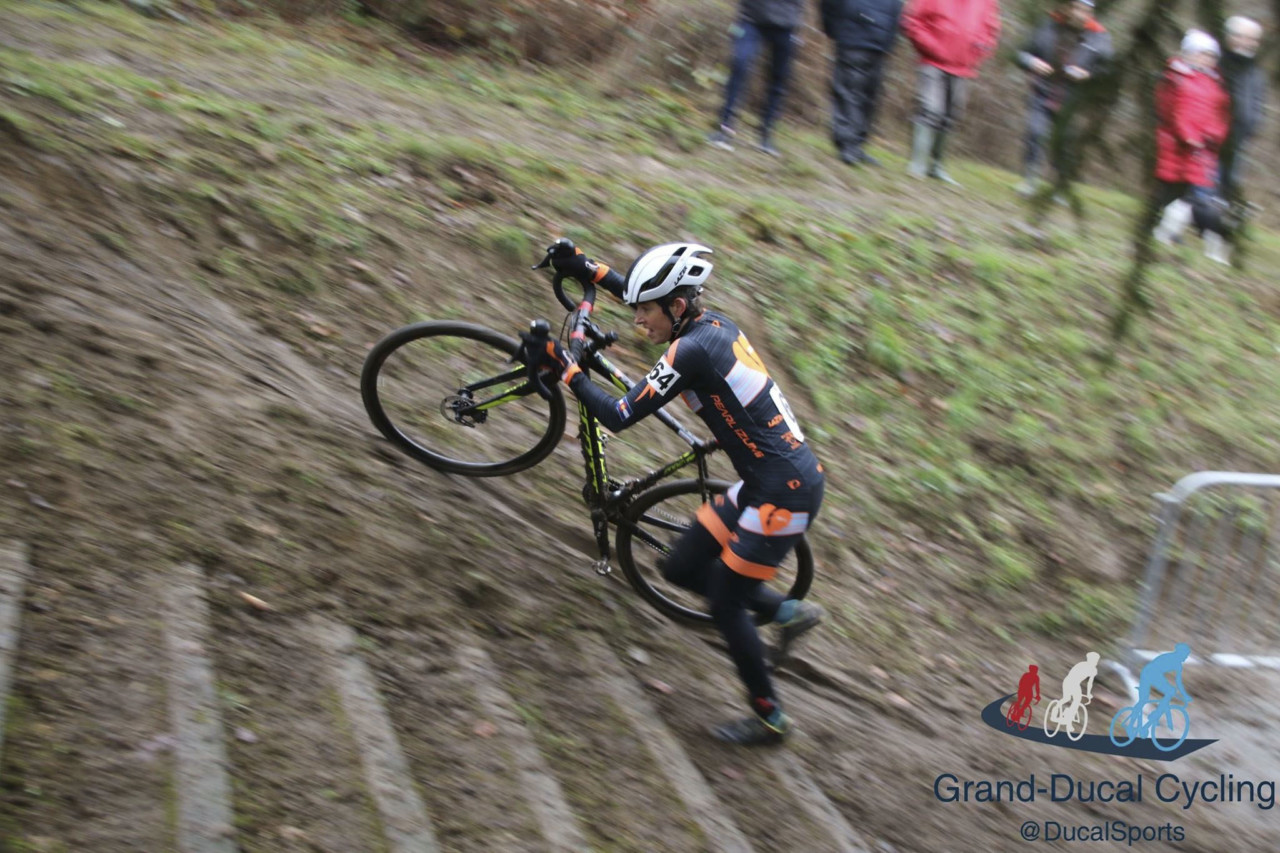
Coogan Cisek was always on the move during Kerstperiode. Corey Coogan Cisek Rider Diary © Grand Ducal Cycling Photography
After last year, I live in fear of “the great Belgian cold,” a hideous thing that hangs on for weeks. At the first throat tickle, I contacted Helen and adjusted my workout. (To her credit, she said, “Take the day off.” A wise one, that Helen.)
I sucked down the zinc. I doused all my food in garlic. I drank tons of tea and hot water with lemons. And, I kept the cold to a minimum! Crisis averted: this year, I did not get the Belgian cold (yet).
What’s Next
Really, it’s been but a brief respite in the action. Friday, my mechanics and I drive across the width of France for the Pont-Château World Cup. There I will meet up with fellow Americans (who might be tanned from warmer climes) and we’ll do it all again!











